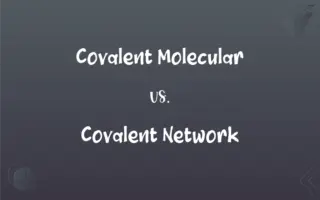Cognition vs. Perception: What's the Difference?
Edited by Aimie Carlson || By Harlon Moss || Published on December 27, 2023
Cognition is the mental process of acquiring knowledge and understanding, while perception is the process of interpreting sensory information.

Key Differences
Cognition encompasses mental processes like thinking, reasoning, and problem-solving. Whereas, perception involves interpreting sensory input to make sense of the world.
Cognition is about how we understand, process, and recall information. Perception is the initial step in processing sensory inputs like sight and sound.
Cognition plays a role in how we analyze and interpret information, while perception is about how we initially experience and recognize stimuli.
Cognition influences how we make decisions and solve problems, in contrast perception affects how we view and interpret the world around us.
While distinct, cognition and perception are interconnected; perception feeds into cognitive processes, influencing how we think and understand.
ADVERTISEMENT
Comparison Chart
Definition
Mental process of knowing, understanding.
Process of interpreting sensory information.
Focus
Involves thinking, reasoning, memory.
Involves recognizing and interpreting stimuli.
Role in Processing
Analyzes and interprets information.
Initial step in experiencing sensory inputs.
Influence on Behavior
Affects decisions, problem-solving.
Shapes how we view and understand the world.
Interaction with World
Based on knowledge and experience.
Based on immediate sensory experiences.
ADVERTISEMENT
Cognition and Perception Definitions
Cognition
The mental action of acquiring knowledge.
His cognition of complex concepts was impressive.
Perception
Involves the recognition of environmental information.
Accurate perception is essential for navigating spaces.
Cognition
Involves processes like thinking and reasoning.
Effective cognition is crucial for problem-solving.
Perception
Encompasses immediate sensory experiences.
Visual perception plays a key role in art appreciation.
Cognition
Encompasses memory and understanding.
Her cognition was evident in her ability to recall detailed information.
Perception
Related to how we sense and understand the world.
Her perception of subtle sounds was incredibly sharp.
Cognition
Relates to how we interpret and process information.
Advanced cognition is needed for analyzing abstract ideas.
Perception
The process of interpreting sensory stimuli.
His perception of colors was uniquely vivid.
Cognition
Includes the ability to make decisions.
Good cognition aids in making informed choices.
Perception
Affects how we interpret and react to stimuli.
His perception of the situation was influenced by his mood.
Cognition
The mental process of knowing, including aspects such as awareness, perception, reasoning, and judgment.
Perception
The process of perceiving something with the senses
The perception of a faint sound.
Cognition
That which comes to be known, as through perception, reasoning, or intuition; knowledge.
Perception
An instance of this
Sense perceptions.
Cognition
The process of knowing, of acquiring knowledge and understanding through thought and through the senses.
Cognition
(countable) A result of a cognitive process.
Cognition
The act of knowing; knowledge; perception.
I will not be myself nor have cognationOf what I feel: I am all patience.
Cognition
That which is known.
Cognition
The psychological result of perception and learning and reasoning
FAQs
Can perception influence cognition?
Yes, the way we perceive things can influence our cognitive processes.
What is cognition?
Cognition is the mental process of acquiring knowledge and understanding through thought, experience, and the senses.
Is memory a part of cognition?
Yes, memory is a key aspect of cognition.
How do cognition and perception differ?
Cognition is about understanding and processing information, while perception is about how we initially sense and interpret stimuli.
How does cognition affect decision-making?
Cognition involves processing information, which is crucial for making decisions.
What is perception?
Perception is the process of interpreting sensory information from the environment.
Can perception be subjective?
Yes, individual experiences and contexts can make perception subjective.
Are cognitive skills trainable?
Yes, cognitive skills like memory and problem-solving can be improved with practice.
How do cognitive impairments affect an individual?
They can affect abilities like reasoning, memory, and understanding.
Is perception a cognitive process?
Perception is considered a part of cognitive processes but is distinct as the initial step of interpreting sensory data.
Can perception be influenced by culture?
Yes, cultural factors can shape how we perceive and interpret stimuli.
Are there disorders that affect cognition?
Yes, disorders like Alzheimer's and ADHD affect cognitive functions.
Does perception only relate to visual stimuli?
No, it also relates to other senses like hearing, taste, and touch.
Can cognitive processes be conscious or unconscious?
Yes, cognition can occur both consciously and unconsciously.
How important is perception in learning?
Perception is crucial in learning as it is the first step in processing information.
Does perception impact interpersonal relationships?
Yes, the way we perceive others can significantly impact our relationships with them.
Does perception directly involve the senses?
Yes, perception is directly tied to sensory inputs like sight, hearing, and touch.
Is perception always accurate?
Not always; perception can be influenced by factors like context and individual differences.
How do emotions affect cognition?
Emotions can influence how we process and understand information.
Can cognition change over time?
Yes, cognitive abilities can change due to factors like aging and learning.
About Author
Written by
Harlon MossHarlon is a seasoned quality moderator and accomplished content writer for Difference Wiki. An alumnus of the prestigious University of California, he earned his degree in Computer Science. Leveraging his academic background, Harlon brings a meticulous and informed perspective to his work, ensuring content accuracy and excellence.
Edited by
Aimie CarlsonAimie Carlson, holding a master's degree in English literature, is a fervent English language enthusiast. She lends her writing talents to Difference Wiki, a prominent website that specializes in comparisons, offering readers insightful analyses that both captivate and inform.






































































